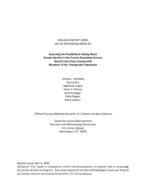
An official website of the United States government
Here’s how you know
Official websites use .gov
A .gov website belongs to an official government organization in the United States.
Secure .gov websites use HTTPS
A lock (
) or https:// means you’ve safely connected to the .gov website. Share sensitive information only on official, secure websites.
-
//
- Census.gov /
- Library /
- Census Working Papers /
- Gender Identity in the CPS: Focus Groups with Transgender Population
Assessing the Feasibility of Asking About Gender Identity in the Current Population Survey: Results from Focus Groups with Members of the Transgender Population
Assessing the Feasibility of Asking About Gender Identity in the Current Population Survey: Results from Focus Groups with Members of the Transgender Population
Abstract
In 2016, the Department of Labor sponsored research to explore the feasibility of adding sexual orientation and gender identity (SOGI) questions to the Current Population Survey (CPS). The emphasis of the research was on the ability and willingness of respondents to answer SOGI questions in the context of an employment survey and via proxy reporting, where one person generally responds for all eligible members of the household. To address these goals, researchers at the Bureau of Labor Statistics (BLS) and U.S. Census Bureau conducted 132 cognitive interviews and four exploratory focus groups. The purpose of this report is to document results of these focus groups, which were conducted with transgender respondents to explore the feasibility of asking about gender identity in the CPS.
Overall, feedback from focus group respondents highlighted a number of obstacles to accurate collection of gender identity in the CPS through proxy response, for which there is no clear solution. Beyond just finding question wording that is understandable and relatable for the heterogeneous transgender population, there are also concerns about the accuracy of reporting and sensitivity of the task. That said, the transgender respondents we spoke to agreed that gender identity would be valuable information to have available on a large-scale government survey such as the CPS.
We find it important to emphasize that these focus groups are exploratory, and we were limited in our ability to fully explain the CPS to respondents and the context in which gender identity questions would appear. Respondents were not administered the CPS interview, and thus we were unable to see how transgender respondents would react to being asked to answer these questions in context. Therefore, opinions expressed in the focus groups were more hypothetical in nature.
Others in Series
Working Paper
Working Paper
Working Paper
Share
Related Information
Some content on this site is available in several different electronic formats. Some of the files may require a plug-in or additional software to view.
 Yes
Yes
 No
NoComments or suggestions?


Top

